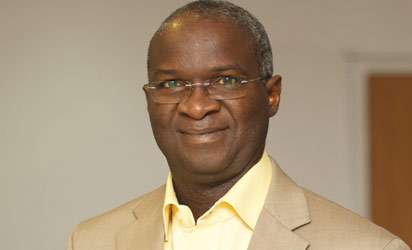The Minister of Power, Works and Housing, Mr Babatunde Fashola, has said that henceforth contractors handling federal roads in the country will be paid according to their performance on the job.
Fashola made this known when he inspected work on sections two and three of the Enugu-Port Harcourt Expressway, covering the Umuahia-Lokpanta-Enugu axis.
He said the measure became necessary to enable the government to know the contractors that were genuine and committed to completing their job.
The minister said that the government expected the contractors to invest their own funds in the job, believing that they would be paid upon the satisfactory completion of the contract.
Fashola said that government was determined to change the old practice where contractors would stop work and idle away on the site because they were not paid.
“Continue to work, do not stop. Send in your certificates and let your consultants and the controllers go through and verify them and once we are satisfied, we will pay,” he said.
He urged the contractors not to bother about looking at the budget to confirm whether or not their names appeared, saying that “the budget is for the bulk and not sections of the road.”
The minister also inspected the Arochukwu Road in Abia, and said that he was satisfied with the quality of work by the contractors.
He expressed joy that the Federal Government had succeeded in bringing the contractors back to site, after three years of inactivity due to the lack of payment.
He said that the resumption of work had helped to revive the economy, adding that workers, who were laid off, had been reinstated by the contractors.
“This is the expectation of President Muhammadu Buhari in using the infrastructure projects to get the nation’s economy out of recession.
The contractors were unanimous in their request for regular funding of the projects to enable them to deliver in record time.
They complained that they suspended work on the projects after they exhausted the initial payments made in 2013, when the contracts were awarded.
For instance, the Project Manager of Setraco Nigeria Limited, Mr Fouad Sarraf, said that the company, which is handling the Umuahia-Okigwe portion of the Enugu-Port Harcourt Expressway, only received N10.9 billion out of the N39.5 billion since the job was awarded in 2013
He said that they would need N28 billion to be able to deliver the 39-km road in two years.
On the Arochukwu Road, the contractor, Mr Nwofor Chukwumeka, said that he had the capacity to complete the 15-km-long project on schedule but said that his major challenge was funding.
Meanwhile, the minister promised to effect the release of funds to him to enable him to expedite work on the project
He further promised that the contract could be extended to Ohafia, measuring 17-km, should he deliver the Arochukwu project on target.
TheNewsGuru.com reports that Fashola had on Thursday inspected the Umuahia-Aba end of the Enugu-Port Harcourt Expressway as well as the Aba-Ikot Ekpene Road, where contractors had also returned to site.
NAN
